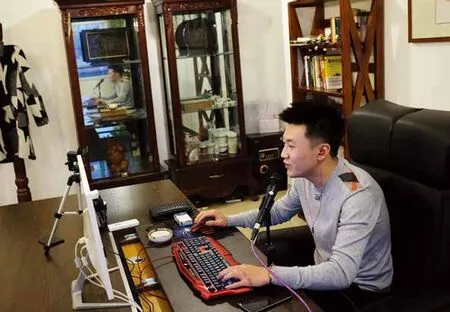IT’S SHOU TIME
2017-06-05
IT’S SHOU TIME
Meet the performers and producers of China’s most popular live-streaming app

Zhou shoots a new video in a teahouse opened by his friend. Most of Zhou’s videos feature Zhou with his Hulin friends. In this scene, he is pretending to be the rich owner of the shop

Zhou and friends at a nightclub in Hulin
THE COMEDIAN
Zhou Qianbai is a 20-year-old striver from Hulin, a small city in Heilongjiang province with a single main street and little in the way of entertainment for men his age. Zhou dropped out of school at 15 and moved southwards, to warmer Guangdong, where he trained in martial arts, hoping to find work as an actor. Lonely and homesick, and having found little in the way of success down south, Zhou returned home in 2014. It was in Hulin, where he now lives with his mother, that he turned to Kuaishou as an outlet for his skills.
The app allows Zhou to indulge his own ideas for sketches and comedy videos. By sharing these clips, Zhou has attracted around 30,000 followers to date. In the recession-hit economy of northeast China, it’s difficult for young people to find a good job; nor can they earn a living simply by broadcasting. Like his girlfriend Jing, 23, who runs a private kindergarten outside Hulin city, Zhou teaches martial arts to kids to help make ends meet. Few believe he is going to become web celebrity like the iconic MC Tianyou, least of all his girlfriend, who doesn’t like or understand his enthusiasm for Kuaishou. She would rather Zhou be a “traditional, caring man” with a reliable job, who dedicates all his free time to her; it’s a constant source of contention for the couple.
But that doesn’t stop Zhou from dreaming. After his parents divorced, his father remarried. Although the two still see each other, Zhou feels his father never really cared about him and looks down on what he does. “If I get rich and famous in the future, I want to buy a big new house for my mother, to thank her for supporting what I’m trying to do,” tsays Zhou.
Although Zhou can earn up to 300 RMB for one of his daily broadcasts, he knows that this is not a sustainable future. Under pressure from his girlfriend, Zhou eventually decided to borrow 20,000 RMB to start his own kung fu class at his girlfriend’s school, teaching students aged 6 to 15 who pay 300 RMB a month. With his weekends spent teaching, Zhou has put his Kuaishou ambitions on hold in order to keep faith with his family—he still makes videos, only these ones promote his new business, rather than his true passion for comedy.

Zhang displays her work during a broadcast. Many of Zhang’s fans are amateur artists who use her videos for tips and advice on improving their own work
THE PAINTER
An art major at Shenyang Ligong University, Zhang Ciman, 22, also helps run a coffee shop in Shenyang where she began her modest broadcasting career about a year ago. By sharing her artwork, performing songs, and taking requests, Zhang has accumulated over 10,000 followers. Hundreds of these fans watch her live shows every day and Zhang uses the virtual gifts from her audience to help pay off tuition fees of around 5,000 RMB per semester, as well as living expenses.
“My mother knows that I’m involved in broadcasting. She even watches my show and helps me deal with some of the problems I have during the performance,” Zhang says. “And by earning money, I feel I am more independent.”

Meiko uses a professional studio to broadcast her live shows. Companies such as hers are springing up all over China to provide working spaces for aspiring Kuaishou celebrities
THE ANCHORS
Twenty-three-year-old Zhao Pengbo has just graduated from the Beijing University of Aeronautics and Astronautics, where he studied to be a flight attendant. Unlike his classmates, Zhao has no immediate plans to start a career which, while seeming glamorous—especially to those who haven’t traveled abroad—can be difficult to advance within. Instead, Zhao has decided to see if he can use his natural charm to make a living as a “cyber anchor,” broadcasting himself singing and chatting with fans. He tapes live shows in a special recording room for three hours day, earning around 5,000 RMB a month.
“It’s a trend and fashionable for young people to try [online broadcasting]. Nowadays the market is growing rapidly,” says Zhao. “I like it because this job is more flexible. I can have the time and space for myself after work. My parents think it’s not even work…I don’t care.”
Fellow anchor Meiko, also from Shenyang, was working as a sales assistant and gym instructor before she discovered Kuaishou and decided she had what it takes to host her own show. She has joined a production company for live streamers which has hired about 30 young anchors, mainly female and provides them equipment and studio space to work. Other than a basic salary of around 2,000 RMB, a top anchor can earn around 20,000 to 50,0000 RMB a month, mainly from payment from their fans, so their survival is dependent on popularity and consistent work.

Dai, who once made thousands of RMB for his performances, now prefers the corporate life, managing others in his agency

Studio systems like Dai's (below) give amateur acts a chance to shine professionally
THE SINGER-TURNEDPRODUCER
Dai Rui is holding court to his fans at his office in Liaoyang, Liaoning province. Just 24, Dai is already a successful entrepreneur and producer of professional live-streaming shows, but he was once an ordinary online performer, like his employees.
Dai first broke into the business in 2014, and his enthusiastic singing soon earned him a massive following. His fans included several rich businessmen who were willing to give him expensive gifts for his performances—soon his income reached as much as 200,000 RMB a month (wealthy users are often motivated to donate large amounts as a show of face; sometimes they even compete to be a performer’s most generous patron).
The income allowed Dai to break out of the performer’s life and become his own producer. The Liaoyang Zhiyuan Culture and Communication Company now turns over several million RMB a year, and Dai has more than a thousand streaming singers on contract.
But despite the wealth and acclaim it brought him, Dai doesn’t miss his singing days. “The broadcasting industry made me successful, it also ruined my normal life,” Dai recalls.“I used to broadcast more than 15 hours a day. It hurt my body badly. Now I have more money than I could imagine, but I still don’t have enough time. If I could do it again, I may not choose to broadcast.”
